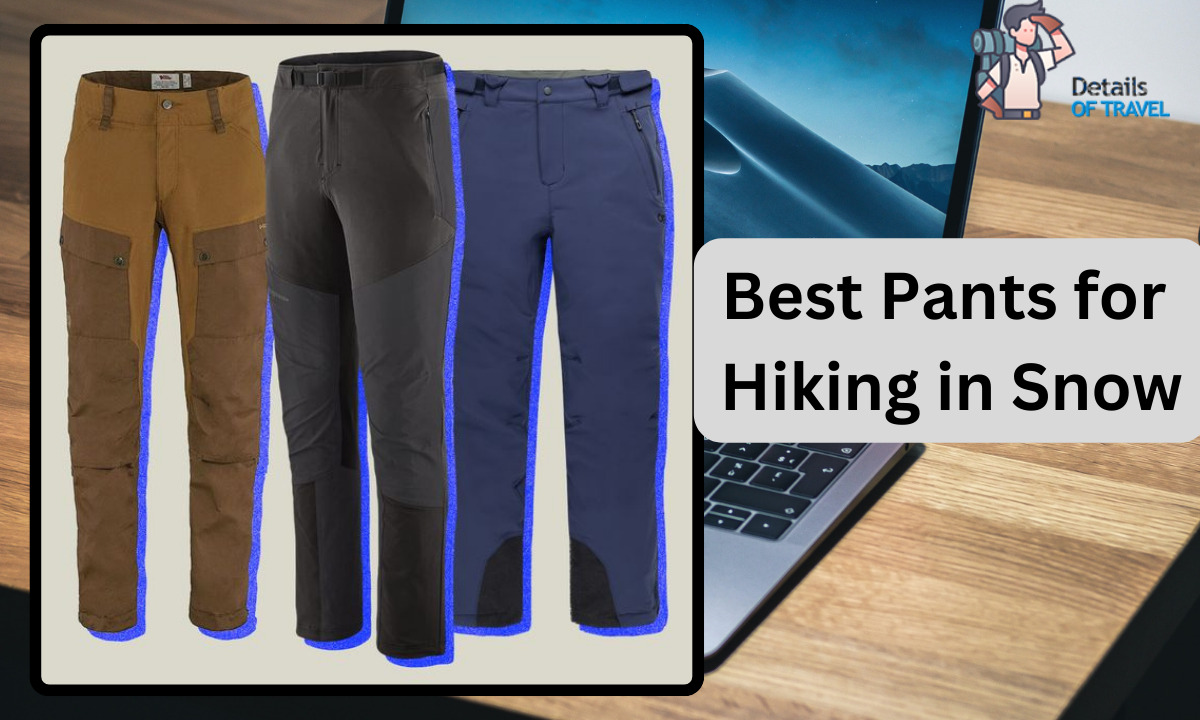The 5 Best Pants for Hiking in Snow

Embark on winter wonder with confidence as we unveil the ultimate guide to the “best pants for hiking in snow.” When the frosty trails call, ensuring warmth, comfort, and durability becomes paramount. Our curated selection navigates through the snowy terrains, presenting you with the top contenders to keep you snug and stylish during your cold-weather adventures.
From insulated wonders to snow-ready features, these pants are your trusted companions for frosty escapades. Say goodbye to chilly discomfort and step into the world of winter exploration with the assurance that your lower half is geared up for the challenge.
Planning a winter hike? Invest in cold-weather hiking pants. These snow trekking trousers are essential winter hiking gear. Stay warm with insulated hiking bottoms and frost-resistant hiking attire. Don’t forget waterproof snow pants for added protection. Thermal hiking trousers ensure comfort in chilly conditions. Enjoy your frosty adventure!
Let’s dive into the cozy world of snow-worthy pants that blend functionality with flair!
Stay Warm and Dry: Choosing the Best Pants for Snow Hiking
1: Snow-ready hiking trousers—Arctic expedition trousers
2: Cold-weather hiking pants—Extreme cold-weather hiking pants
3: Insulated hiking bottoms—Frost-resistant outdoor bottoms
4: Winter trekking pants—Polar trekking pants
5: Snowproof hiking apparel—Subzero hiking apparel
6: Freeze-resistant outdoor pants—Blizzard-proof trail pants
7: Best snow hiking gear—Snow trekking essentials
8: Cold-climate trail pants—Glacier exploration pants
9: Snow adventure trousers—Alpine-ready hiking trousers
10: Insulated outdoor wear for snow hikes—Cold-resistant outdoor legwear
Best Pants for Hiking in Snow
1. Snow-Ready Hiking Trousers:
Features:
Specially designed with materials and construction to withstand cold and snowy conditions.
Why do we like it:
These trousers offer a tailored solution for winter hikes, providing insulation and protection against the elements.
2. Cold-Weather Hiking Pants:
Features:
Crafted for use in low temperatures, providing warmth and flexibility.
Why do we like it:
Ideal for those who enjoy hiking in colder seasons, offering a balance between insulation and mobility.
3. Insulated Hiking Bottoms:
Features:
Built-in insulation to retain body heat during winter hikes.
Why do we like it:
Keeps you warm in icy conditions, ensuring a comfortable and enjoyable hiking experience.
4. Winter Trekking Pants:
Features:
Tailored for winter trekking with a focus on warmth, durability, and mobility.
Why do we like it:
Specifically crafted to meet the demands of winter trekking, offering reliable performance in cold conditions.
5. Snow Proof Hiking Apparel:
Features:
Waterproof or water-resistant materials to keep you dry in snowy conditions.
Why do we like it:
Ensures protection against snow and moisture, maintaining comfort during winter hikes.
6. Freeze-Resistant Outdoor Pants:
Features:
Engineered to resist freezing temperatures and maintain flexibility in cold weather.
Why do we like it:
Ideal for environments with freezing temperatures, ensuring you stay comfortable and mobile during outdoor activities.
7. Best Snow Hiking Gear:
Features:
Comprehensive gear designed to enhance the snow-hiking experience, including pants optimized for snowy conditions.
Why do we like it:
A holistic approach to winter hiking, providing the best gear to tackle challenges associated with snowy environments.
Planning a winter adventure? Invest in high-quality gear like alpine trekking pants, sub-zero hiking apparel, and snow-resistant outdoor pants. These winter expedition trousers are a must for glacier hiking and ice climbing. Don’t forget to equip yourself with polar trekking gear for a comfortable and safe journey.
8. Cold-Climate Trail Pants:
Features:
Tailored for trails in cold climates, balancing insulation, durability, and trail-specific functionality.
Why do we like it:
Perfect for those who venture into cold climates for trail adventures, offering specialized features for trail conditions.
9. Snow Adventure Trousers:
Features:
Specifically designed for a range of winter adventures, providing comfort and protection in snowy conditions.
Why do we like it:
Versatile pants were suitable for various winter activities, ensuring you’re ready for any snow-filled adventure.
When it comes to tackling icy adventures, having the right gear is crucial. Enter extreme cold hiking apparel, your ticket to frostbite-proof excursions. Snowshoeing pants and blizzard-resistant outdoor attire are game-changers. Don glacier exploration pants for snow-ready trekking wear. Stay warm, stay safe – conquer the cold!
10. Insulated Outdoor Wear for Snow Hikes:
Features:
Outdoor wear with built-in insulation for warmth during snow hikes.
Why do we like it:
Provides a comprehensive solution for outdoor activities in snowy conditions, keeping you warm and comfortable.
Stay Dry on the Trails: The Ultimate Guide to Hiking Pants for Rain”
Step 1: Understand Your Needs:
Before diving into options, assess your hiking needs. Consider factors like temperature, snow conditions, and your preferred level of activity. This understanding will guide your choices.
Step 2: Insulation Matters:
Opt for pants with quality insulation to keep you warm in chilly conditions. Look for materials like fleece or synthetic insulation for effective temperature regulation.
Step 3: Waterproof and Breathable:
Snow hiking often involves contact with wet surfaces. Choose pants with a waterproof outer layer to keep moisture out. Additionally, prioritize breathability to prevent overheating during strenuous hikes.
Step 4: Durable and Windproof:
Snowy terrains can be harsh, so durability is key. Select pants made from robust materials resistant to abrasions. Windproof features are also crucial to shield you from biting cold winds.
Step 5: Fit for Comfort:
A proper fit enhances comfort and performance. Look for adjustable waistbands, articulated knees, and gusseted crotches for ease of movement. Consider a slightly roomier fit to accommodate layers underneath.
Step 6: Layering Compatibility:
Layering is essential in snowy conditions. Ensure your pants can be comfortably worn over thermal leggings or base layers without compromising mobility.
Step 7: Pockets and Features:
Functional pockets are a plus for storing essentials. Check for features like reinforced knees, integrated gaiters, and ventilation zippers to enhance versatility and adaptability.
Step 8: Brand Reputation and Reviews:
Trust reputable outdoor brands with a history of producing high-quality gear. Read reviews from fellow hikers to gain insights into real-world performance and durability.
Step 9: Budget Considerations:
While quality is paramount, consider your budget. Many reputable brands offer a range of options, so you can find pants that balance performance and cost.
Step 10: Check Sizing Charts:
Sizes may vary between brands, so consult sizing charts to ensure a precise fit. This step helps prevent discomfort during your snowy escapades.
FAQs
What features should I look for in the best pants for hiking in the snow?
Waterproof and breathable materials, insulation, and reinforced knees are essential for optimal performance.
Are there specific brands known for producing the best snow hiking pants?
Yes, brands like Arc’teryx, Patagonia, and The North Face are renowned for their high-quality snow hiking pants.
Can I use regular winter pants for snow hiking?
While some winter pants may work, it’s recommended to choose specialized snow hiking pants for better insulation and moisture resistance.
What is the ideal insulation for snow hiking pants?
Synthetic insulation, such as PrimaLoft or Thinsulate, provides warmth even when wet and is preferable for snow hiking.
Are bib-style snow pants better than regular pants for hiking in snow?
Bib-style pants offer extra protection against snow entering from the waist, making them a good choice for deep snow conditions.
How do I determine the right size for snow hiking pants?
Refer to the brand’s sizing chart and consider wearing layers underneath; a slightly roomier fit is often more comfortable for hiking.
Can I wear jeans for snow hiking?
Jeans are not ideal for snow hiking as they absorb moisture and can become heavy and cold. Opt for moisture-wicking and waterproof materials.
Should I prioritize breathability in snow hiking pants?
Yes, breathability is crucial to prevent overheating and moisture buildup. Look for pants with vents and breathable fabrics.
Are gaiters necessary when wearing snow hiking pants?
Gaiters can provide additional protection against snow entering your boots, especially in deep snow, making them a good accessory.
Can I use ski pants for hiking in the snow?
Ski pants may work, but ensure they offer mobility, breathability, and features suitable for hiking, as some ski pants may be too restrictive.
Conclusion
Armed with this comprehensive guide, you’re ready to choose the best pants for your snow hiking adventures. Whether you’re tackling icy trails or trekking through powdery snow, the right pants will keep you warm, dry, and comfortable throughout your journey.
Finding the best pants for hiking in snow boils down to prioritizing features like waterproofing, insulation, and breathability. Explore top brands, understand key considerations, and make an informed choice for your next snow adventure with our comprehensive guide.
